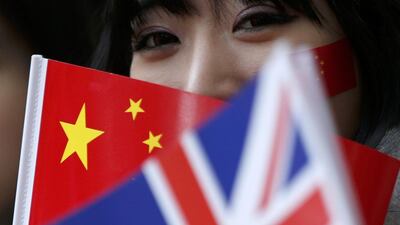The British government is being attacked on all sides for the welcome it is giving China’s president. Xi Jinping is being treated to the works, with a formal state dinner, address to parliament, and time allotted for him to spend with so many members of the royal family, from the Queen and Prince Philip, to Princes Charles, William and Andrew, that one wonders whether the general secretary of the Chinese Communist Party has a secret soft spot for hereditary monarchies.
“The howls of China’s prisoners will haunt this royal welcome for Xi Jinping,” was one typical headline on an article complaining that the Cameron administration’s “fawning” behaviour, while failing to bring up human rights issues, was “an insult to the citizens of Britain, who cherish their hard fought freedoms”.
Angela Merkel has been similarly abused for “selling out” western principles and commitments after she called recently for the rebel-held areas of East Ukraine to return to rule from Kiev, but specifically excluded the Crimean peninsula that Russia annexed last March. This, it has been suggested, means that the West has effectively caved in to the brazen flouting of international law and borders, and has allowed Vladimir Putin to get away with the most audacious land grab for decades, if not since the 1930s.
But in both cases, I would argue, such pragmatic accommodations are entirely wise.
In the first instance, Britain needs to have a good relationship with the next rising power, and would be foolish to miss out on a huge opportunity for trade that will support British jobs in the future. What the UK’s chancellor George Osborne hopes will be a “golden decade” in relations between the two countries could produce £100 billion (Dh568bn) in investment in British industry and infrastructure.
Not for the first time, Britain was late to the party when it came to engaging with China. Making up for that, by leading the fence-sitters into joining the Chinese-led Asian Infrastructure Investment Bank in March – much to the displeasure of the White House – and now deciding to be “the western country that is most open to China”, as Mr Xi put it this weekend, is indeed, as he also said, “a visionary and strategic choice that fully meets Britain’s own long-term interest”.
Critics raise issues of free speech, censorship, democracy and the rights of Tibetans; and it may well be true that life can be very uncomfortable for dissenters and government opponents in China. It is not clear, however, what raising these matters with previous leaders has ever achieved – apart from irritating the leaders of a country that views itself as retaking its rightful place in the world.
Moreover, as Jim O’Neill – the Goldman Sachs executive who coined the acronym Brics, and who is now a UK treasury minister – has pointed out, the Chinese have a far better memory of abuses committed on their soil by foreign powers than do the latter. “You can have your ear chewed off by Chinese policy makers about the long-term history of human rights,” he told the Financial Times last month. “We have to be careful about getting on to a platform on that with regard to Hong Kong in particular. Lots of Chinese people including their leaders think we were pretty naughty.”
Martin Jacques, author of When China Rules the World, believes that the country is in any case becoming much freer, and emphasises its lifting 600 million people out of poverty – “arguably the single biggest global contribution to human rights over the last three decades”.
One might also add that Mr Xi’s anti-corruption crusade is also surely worthy of praise, even if his motives are partly to shore up the legitimacy of the Communist Party (and possibly remove the odd potential rival). If it makes the country more meritocratic and leads to a greater sharing of the proceeds of growth, shouldn’t we applaud?
In the case of Crimea, the stark reality is that nothing short of an invasion by Nato is going to persuade Mr Putin to relinquish an inch of soil. And although the manner in which Crimea was annexed is to be deplored, it was arguably correcting a historic mistake. The province had been under Russian control since 1783, and its transferral to Ukraine in 1954 was mostly symbolic and administrative – given that it occurred within the overall Soviet Union. There was also some dispute about the legality of the move. Either way, Mr Putin has presented Europe with a fait accompli. Does anyone want to go to war over it?
Pragmatic accommodation in both these instances is not the same as allowing major powers to do whatever they like. It is important to make the distinction that the Chinese government rejects the western liberal democratic worldview. By its own codes, it is not doing anything wrong. Those who lecture on Tibet or democracy are therefore seeking to impose alien values. Similarly, a resurgent Russian nationalism sees Crimea returning home, not being stolen (from a country that many believe does not really exist, in any case).
We may disagree. But neither is a case of internal hypocrisy. We must deal with countries as they see themselves, not just as the proponents of the western-ordered international system view them. This does not mean, to paraphrase John Stuart Mill’s On Liberty, that countries should not continue to remonstrate, reason with, persuade or entreat China, Russia or any other power. But it does mean accepting that “over itself, over its own body and mind, the state is sovereign”.
If this is pragmatism, it is also a principle – albeit an unfamiliarly relativist one in a world dominated by western universalism for so long. It may be unsettling to some. We had, however, better get used to it.
Sholto Byrnes is a senior fellow at the Institute of Strategic and International Studies, Malaysia


